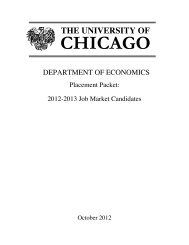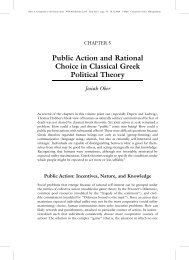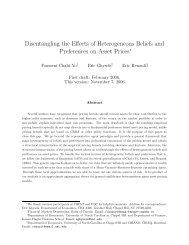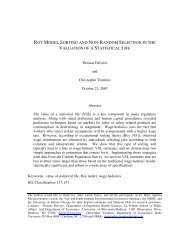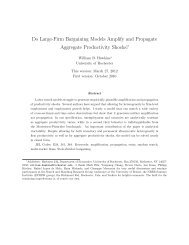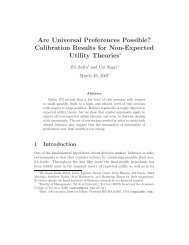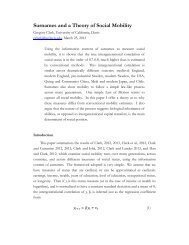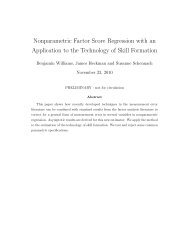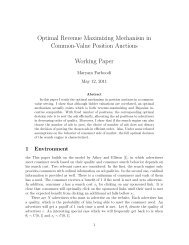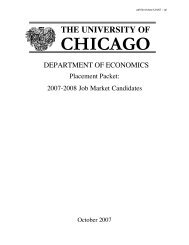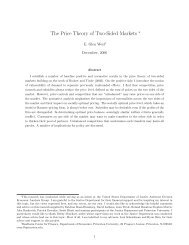CHICAGO - University of Chicago Department of Economics
CHICAGO - University of Chicago Department of Economics
CHICAGO - University of Chicago Department of Economics
You also want an ePaper? Increase the reach of your titles
YUMPU automatically turns print PDFs into web optimized ePapers that Google loves.
YONG WANG<br />
5433 South Cornell Ave, Apartment 1N, <strong>Chicago</strong>, IL 60615 wangyong@uchicago.edu<br />
Phone: (773) 401- 0382<br />
http://home.uchicago.edu/~wangyong<br />
EDUCATION Ph.D. <strong>Economics</strong>, <strong>University</strong> <strong>of</strong> <strong>Chicago</strong> Expected June 2009<br />
M.A. <strong>Economics</strong>, CCER, Peking <strong>University</strong>, China, highest distinction June 2003<br />
B.A. International <strong>Economics</strong>, Fudan <strong>University</strong>, China, Summa cum Laude June 2000<br />
FIELDS Primary: Political Economy, Growth and Development, Economic Theory<br />
Secondary: Public Finance and International <strong>Economics</strong><br />
JOB MARKET PAPER<br />
Fiscal Decentralization, Endogenous Policies and Technology Adoption: Theory and Evidence from China and India’s FDI<br />
[Abstract] A political economy model is developed to explain why two developing economies with the same economic fundamentals<br />
can have different de facto economic policies and hence receive dramatically different amount <strong>of</strong> FDI (foreign better technology). I<br />
show how fiscal decentralization can have a non-monotonic and dramatic impact on policies and FDI. Too much fiscal<br />
decentralization can hurt the central government's incentives hence it chooses the policy pr<strong>of</strong>iles to induce the local government to<br />
block FDI. Too little fiscal decentralization can render the local government captured by the protectionist special interest group. I also<br />
show how FDI may bifurcate because the local government’s preference for FDI can be endogenously polarized thus a small change<br />
in fiscal decentralization might radically shift the local government’s policy. The simulation/calibration results closely match China<br />
and India’s macro and policy data. Counterfactual experiments indicate that the degree <strong>of</strong> fiscal decentralization can well explain why<br />
these two economies at similar development stage have a nine-fold difference in FDI per capita.<br />
SELECTED<br />
PAPERS<br />
IN PROGRESS<br />
[1] Endogenous Social Infrastructure and Economic Development, Sept. 2007 (under review)<br />
(Illinois Economic Association Best PhD Student Paper Award, Illinois, 2007)<br />
[2] Institutional Barrier, Learning Externality and Catching Up, May 2007 (under review)<br />
[3] Factor Endowment, Specialization and Trade: Theory and Empirics,<br />
with Jiandong Ju and Justin Yifu Lin, China Economic Quarterly, No.1, 2005 (in Chinese)<br />
[4] Endogenous Coalition, Economic Growth and Inequality, World Economic Papers, No.2, 2004 (in Chinese)<br />
Over six published Chinese papers and three translated books including Fudenberg and Tirole’s Game Theory<br />
[1] Endowment Structure and Optimal Industrial Upgrading, with Justin Yifu Lin and Jiandong Ju<br />
[2] Revisiting Uniqueness <strong>of</strong> Global-Game Equilibrium with Market Prices, with Balazs Szentes<br />
[3] A Global-game Model <strong>of</strong> FDI with Heterogeneous Beliefs on Institutional Entry Cost<br />
[4] Political Competition, Contract Incompleteness and FDI: Theory and Evidence from China, with Weijun Hu<br />
LECTURER [1] Topics on Macroeconomics and Development (G), CCER, Peking <strong>University</strong>, 2006<br />
[2] Intermediate Microeconomics (U), <strong>University</strong> <strong>of</strong> <strong>Chicago</strong>, 2007<br />
[3] Topics on Chinese Economy (U), <strong>University</strong> <strong>of</strong> California, China Center, 2003<br />
TA (<strong>Chicago</strong>):<br />
RA&WORKING<br />
EXPERIENCE<br />
FELLOWSHIPS<br />
&HONORS<br />
PhD: Theory <strong>of</strong> Income III; Price Theory I & II; Formal Models <strong>of</strong> Policy Making<br />
Advanced Undergraduate: Development <strong>Economics</strong>; <strong>Economics</strong> <strong>of</strong> Information; Auction Theory<br />
RA for Lars Peter Hansen (2005-2007) and RA for Gary Becker (2006)<br />
Consultant, World Bank, DECVP, Summer 2008<br />
Martin and Margaret Lee Prize for Best Core Exam in Price Theory, <strong>University</strong> <strong>of</strong> <strong>Chicago</strong>, 2004<br />
Esther and T. W. Schultz Dissertation Fellowship & Sprinkel Research Fund, U. <strong>of</strong> <strong>Chicago</strong>, 2007-2009<br />
<strong>University</strong> <strong>of</strong> <strong>Chicago</strong> Fellowship, 2003-2007<br />
Fellowship, Argonne-<strong>Chicago</strong> Computational <strong>Economics</strong> Summer School, 2006<br />
Xuji Prize for Academically Distinguished Ten Graduate Students <strong>of</strong> Peking <strong>University</strong>, 2003<br />
PRESENTATIONS North American Econometric Society Summer Meetings (2008), Far East Econometric Society Summer<br />
Meetings (2008), NBER Political Economy Workshop (2007), Midwest Macro Meetings (2008), Midwest Theory/ Trade Conference<br />
(2008), Macro and Micro Working Groups, Political Economy Workshop, <strong>University</strong> <strong>of</strong> <strong>Chicago</strong> (2005-2008), Macro and Growth<br />
Seminar, World Bank (2008), IMF Seminar (2008), East -West Center (2007), Peking <strong>University</strong> (2006)<br />
REFERENCES Roger Myerson (Chair) (773)702-6576 myerson@uchicago.edu<br />
Gary Becker (773)702-8191 gbecker@uchicago.edu<br />
Lars Peter Hansen (773)702-7587 l-hansen@uchicago.edu<br />
Casey Mulligan (773)702-6576 c-mulligan@uchicago.edu<br />
Nancy Stokey (773)702-8250 nstokey@uchicago.edu



